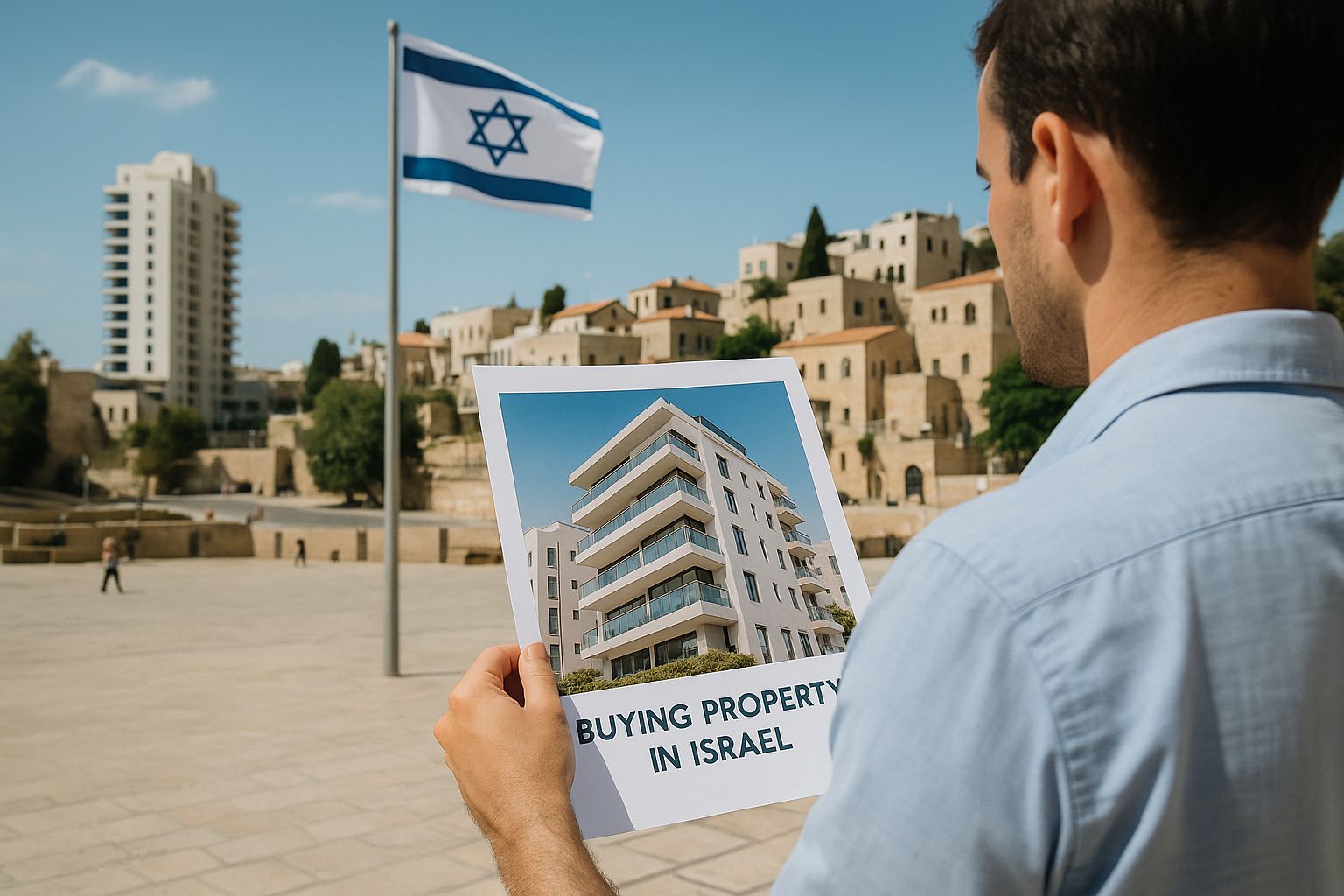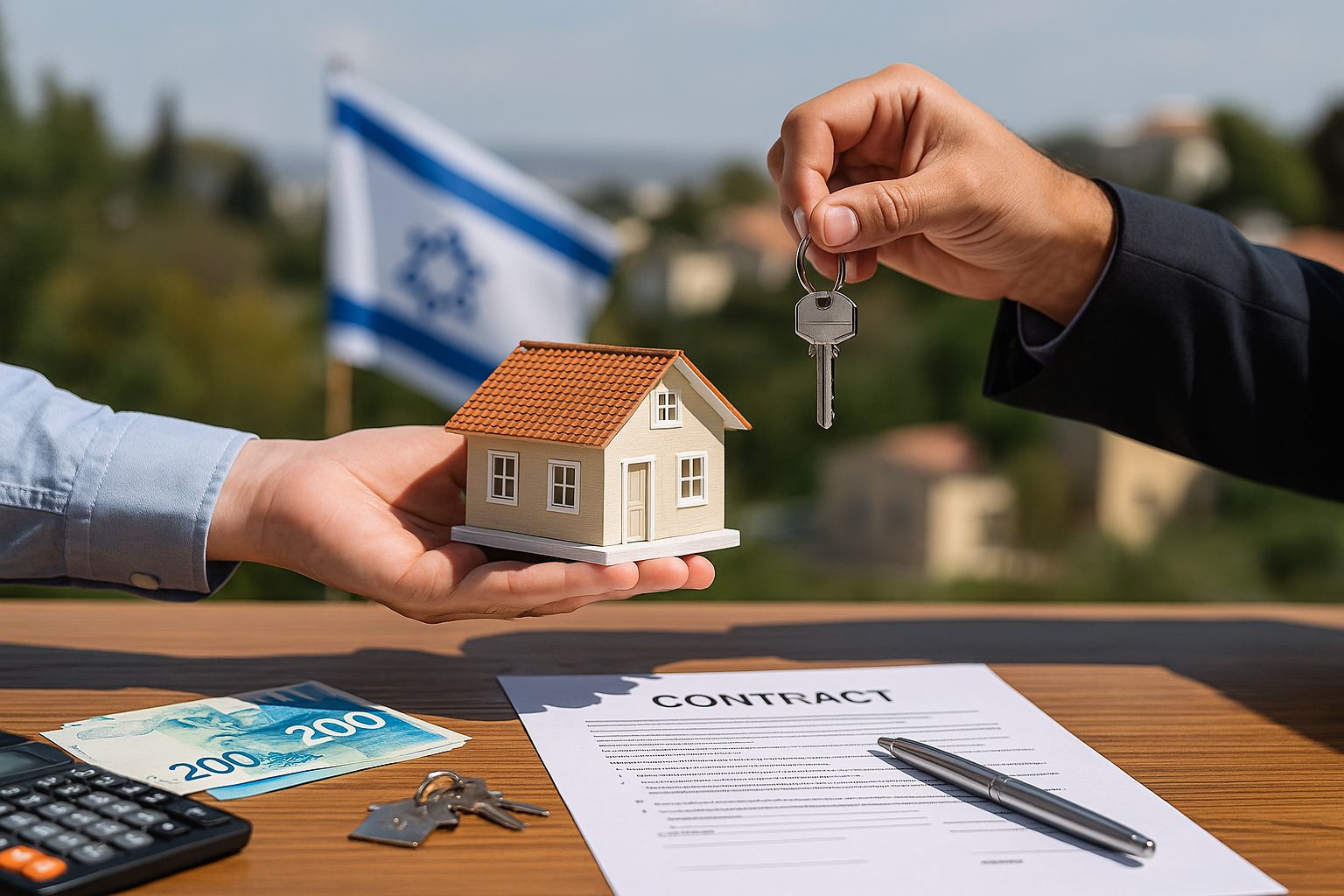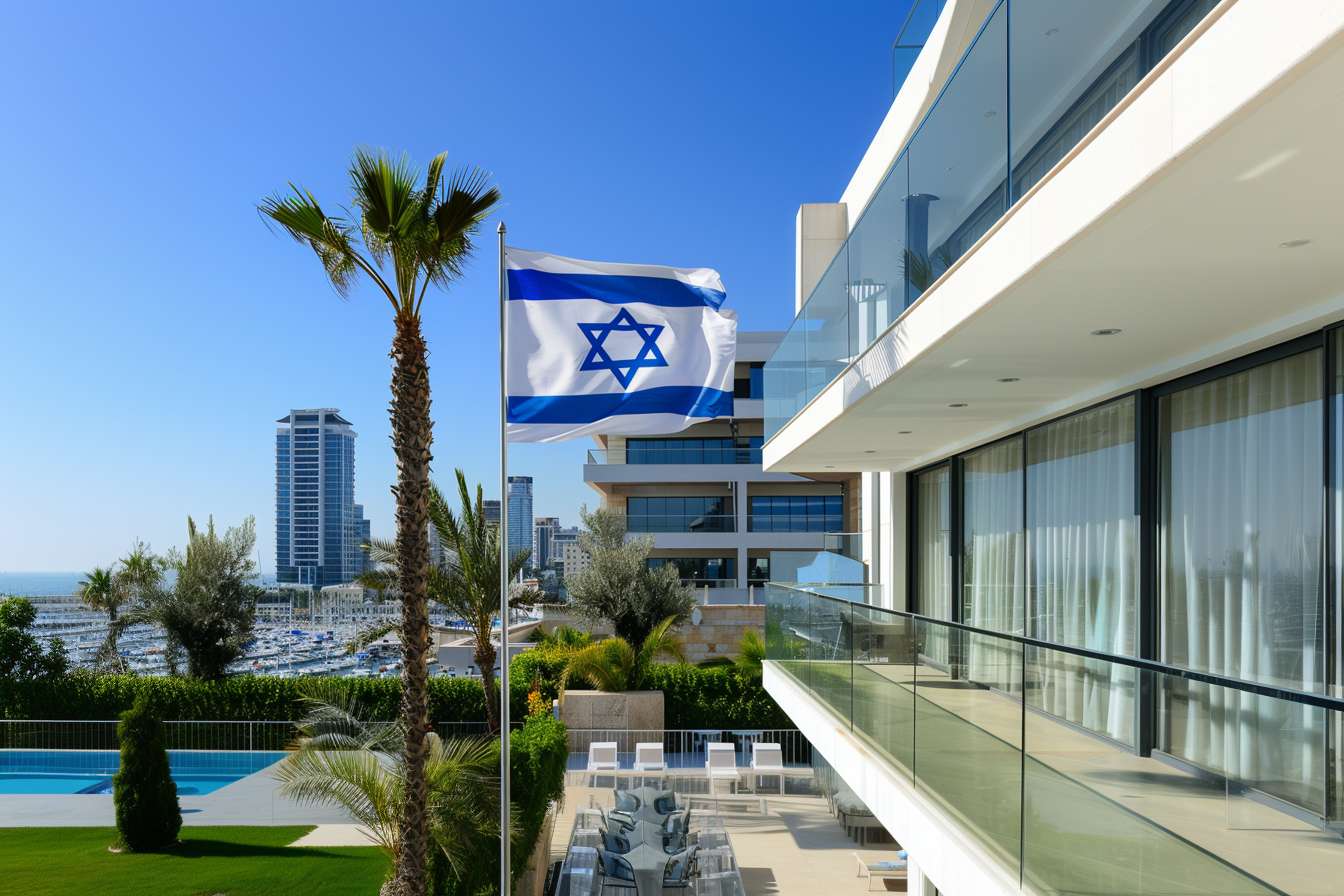In this Guide:
Dreaming of owning a piece of the Holy Land? Whether you're investing, building a home, or planning your future Aliyah, buying land in Israel is a unique journey. We’ve helped countless people through the process—this guide will break it all down step-by-step, clearly and simply.
Key Takeaways:
- Foreigners can buy land in Israel, but most land is leased from the state, and you'll need legal representation and possible permissions depending on the area.
- There are different types of land—urban, agricultural, private, and state-owned—each with unique rules and opportunities.
- Costs go beyond the purchase price, including taxes, fees, and legal costs. Knowing what you’re responsible for upfront is critical.
- Top regions for buying land include Tel Aviv, Jerusalem, the Negev, and the Galilee—each with different investment potential and lifestyle benefits.
What is Land Ownership in Israel?
If you’re planning to buy land in Israel, here’s your first curveball: most land isn’t really sold—it’s leased. In fact, over 90% of land in Israel is state-owned and managed by the government.
Israel Land Authority
The Israel Land Authority (ILA) manages most of the country’s land. Instead of selling it, they lease it long-term—usually for 49 or 98 years. Foreigners can lease land, especially since recent reforms, but you’ll need legal help. We break this down in our real estate guide.
Types of Land in Israel
- Private land: rare but fully ownable
- State-owned land: leased via the ILA
- JNF land: tied to Jewish heritage, leased to Jews only
The system is unique, and transactions go through official channels. Expect paperwork, approvals, and lots of patience. But don’t stress—we’ve seen many Olim and investors navigate it successfully with the right help.
Why is Buying Land in Israel Important?
Buying land in Israel isn’t just a transaction—it’s a deeply personal, cultural, and financial move. Whether you're making Aliyah or investing from abroad, owning land connects you to the future of Israel in a real way.
At Native Israel, we’ve helped so many people make sense of the process, from finding the right place to understanding all the hidden rules.
Investment Perspective
Israel’s property market is known for its long-term stability, even during global uncertainty. From Tel Aviv’s high-tech boom to the Negev’s growth potential, land here is a smart long-term play.
Tip: Check out our Israel property investment guide to see where the smart money’s going.
Cultural Significance
For many, land ownership is a connection to heritage. A Canadian oleh we know bought a tiny agricultural plot near Tiberias thinking he’d raise goats. Two weeks later, he discovered zoning laws didn’t allow livestock—or homes.
He laughed and said, “Guess I own a scenic picnic spot now!”
Moral: research before romance.
How Can Foreigners Buy Land in Israel?
So—you’re not Israeli (yet), but you want to buy land in Israel. Good news: it’s possible! But you’ll need to jump through a few more hoops than locals do. Don’t worry, we’ve helped tons of olim, expats, and even curious investors make it happen.
Eligibility Requirements
If you’re not an Israeli citizen, your purchase might need special government approval. Some areas, like border regions or agricultural zones, have restrictions. Plus, foreigners often need to provide security clearances—yep, even for land!
Olim have an easier time, especially if you're going through the Aliyah process. Also, check out potential Aliyah benefits—you might qualify for tax breaks and reduced fees!
Legal Representation
You’ll need a real estate lawyer who understands the system. They’ll prep your contracts, run title checks, and deal with the land registry. Don’t DIY this part—seriously. We know a British investor who skipped legal review and bought land with unpaid taxes attached. Ouch.
Tip: Choose someone local and experienced in foreign transactions.
Want to see if land ownership fits your long-term goals? Browse our moving to Israel resources—we’ve got tips for every step. to find out more about representation, you can check out LegalImmigrationIsrael !
What Are the Different Types of Land Available in Israel?
When you’re ready to buy land in Israel, knowing what type of land you're looking at is everything. Different land types come with different rules, restrictions, and—yes—possibilities.
Let’s break it down:
Urban Development Land
This is land in or near cities. Think apartment blocks, commercial centers, or new neighborhoods. Great for long-term growth, but expect high prices and lots of competition. Areas like Jerusalem, Ramat Gan, and Petach Tikva are seeing serious expansion.
Tip: Make sure development rights are clear before buying.
Agricultural Properties
These are more rural and generally cheaper—but you can’t just build a house and move in. Many are zoned for farming only. Still, if you’re dreaming of a vineyard or olive grove, it could be perfect.
Also, you’ll find kibbutz and moshav structures, where the land is often leased collectively or requires membership approval.
Residential vs. Commercial
Residential plots are usually smaller and come with clear building rights. Commercial land? More expensive, but it can bring serious rental income.
For deeper zoning details, check out our property tax guide—it can help you understand what you’re really buying.
Where Are the Best Areas to Buy Land in Israel?
Israel’s not huge, but when it comes to buying land, location is everything. Whether you’re after investment potential, a lifestyle change, or a future retirement home, there’s something for everyone.
Metropolitan Areas
- Tel Aviv: High prices, high demand—great for flipping or renting
- Jerusalem: Strong long-term value, religious and cultural appeal
- Haifa & Northern Coast: More affordable with room to grow
Developing Regions
- Negev Desert: Government incentives, cheaper prices, eco-communities
- Galilee: Stunning views, great for residential land
- Border Areas: Riskier, but often deeply discounted
A couple from New Jersey we helped fell in love with a mountain plot in the Galilee. They didn’t realize it was zoned for agriculture only—until they asked why there was a goat farm next door. Classic.
Need help picking a region? Our where to live in Israel guide is packed with tips to match your lifestyle with the right spot.
What is the Process for Purchasing Land in Israel?
Now let’s talk process. Buying land here isn’t overly complicated—but it’s not the wild west either. If you're prepared and know the steps, it’s totally doable.
Property Search Phase
Start with a trusted local agent or platform. Use verified listings (ask for Taba approval—zoning) and visit the land if you're in Israel. Not here? Plenty of buyers do it remotely with a local rep.
Explore listings through Native Israel’s property resources, which break it all down for new immigrants, expats, and investors.
Transaction Documentation
Once you’ve found your plot, you’ll sign a purchase agreement, then register it through the Land Registry (Tabu). You’ll likely use escrow and pay in stages—usually a deposit, then balance after due diligence.
Tip: Always double-check the title is clean—no hidden debts or liens.
If you're unsure about any step, the moving to Israel guide is full of checklists and insights from people who’ve done it right.
What Are the Costs Associated with Buying Land in Israel?
Let’s talk numbers. Buying land in Israel includes more than just the sticker price. Understanding all the hidden costs upfront can save you time, money, and stress.
Acquisition Taxes
The main cost? Purchase tax (Mas Rechisha). This varies based on the land's use, location, and whether you're a resident, investor, or new immigrant (Oleh). You may also encounter VAT (Value Added Tax) on certain purchases, especially from companies.
Professional Fees
Here’s what to budget for:
- Lawyer fees (0.5%–1.5% of the purchase price)
- Surveyor or appraiser: important for verifying land size and value
- Agent commission: typically 2% + VAT
- Land registry fees: for official ownership transfer
Also consider ongoing costs like arnona (property tax), especially if you plan to build.
Want to plan your budget properly? Our mortgage in Israel guide explains financing options that may influence how much you need upfront.
At Native Israel, we walk you through all these steps so you know exactly what to expect when investing or moving here.
What Challenges Do Foreign Buyers Face When Purchasing Land in Israel?
So you’re ready to buy land in Israel, but suddenly—bam!—you hit your first roadblock. Don’t worry. We’ve seen it all. From language gaps to legal confusion, foreign buyers face unique hurdles. But with the right support, you can totally navigate them.
Bureaucratic Hurdles
There’s paperwork. Lots of it. And it usually has to pass through multiple government agencies—each with their own timelines. Security checks, zoning approvals, and land registry can all take longer than expected.
One oleh we worked with submitted the same form three times—because it kept getting “lost in the system.” He now jokes that Israel’s national bird must be the missing document.
Tip: Be patient, and triple-check everything before submitting.
Market Navigation
Negotiating in Israel is… different. Sellers might not list full details up front, and prices aren’t always set in stone. Knowing how to spot real opportunities takes experience.
Our guide to starting a business in Israel dives into similar market quirks—handy even if you’re just buying land, not launching a startup.
What Financing Options Are Available for Land Purchases in Israel?
You want to buy land in Israel, but don’t have a suitcase of shekels lying around? Totally normal. Financing land purchases here is possible—but a bit trickier than financing an apartment.
Israeli Banking Options
Some banks offer mortgages for land, but expect higher down payments (often 50% or more). Interest rates can also be steeper than for residential property. Foreign buyers will need extra paperwork—so start early.
Alternative Financing
You can also explore:
- Developer payment plans (common in new projects)
- Private lenders (faster, but riskier)
- International banks with Israel-focused programs
Tip: Shop around. Not all banks treat foreign buyers the same. Some Olim have found success through Israeli branches with English-speaking reps.
Need more help navigating banks and bureaucracy? Our guide to sending money to Israel can help you understand transfer limits, timelines, and best-value options.
What Are the Best Practices for Buying Land in Israel?
Want to buy land in Israel without the stress, confusion, or last-minute surprises? There’s a method to the madness. After helping hundreds of Olim and expats, here’s what really works.
Professional Assistance
Build your team early:
- A real estate lawyer (non-negotiable)
- A local agent who knows the zoning quirks
- A surveyor to verify land boundaries
If you’re buying from abroad, ask about power of attorney—it lets someone trustworthy represent you on the ground. Remote buying is 100% doable, and many people have done it with help from Native Israel’s local experts and relocation resources.
Documentation Verification
Before signing anything, do your homework:
- Get a title search to confirm legal ownership
- Check for planning and building permits
- Look for encumbrances like unpaid taxes or claims
Tip: Always ask for the “nesach tabu”—that’s the official land registration extract.
For other legal must-knows and life admin tips, visit our how to get an Israeli passport guide—helpful even if you're just looking ahead.
How Do Recent Policy Changes Affect Land Purchases in Israel?
The rules around how to buy land in Israel aren’t frozen in time—policy shifts happen often, and they can seriously affect your options.
Regulatory Evolution
Israel has slowly liberalized its land ownership laws, especially for foreigners. While most land is still leased, newer reforms allow more flexibility in areas like the Negev and Galilee. There’s also growing support for making some leases transferable or renewable on better terms.
Tax Implications
Tax policies have also changed. Purchase tax brackets were updated, and foreign buyers may face higher rates. On the flip side, some exemptions now apply to Olim within their first few years.
Tip: Stay updated. Policies shift fast. Our top benefits of Israeli citizenship guide is great for long-term planners who want the full picture.
At Native Israel, we track these changes for you—so you don’t get caught off guard mid-deal.
Final Thoughts
To buy land in Israel is exciting, but it’s a maze without a map. That’s where Native Israel comes in—with guides, tips, and real people who’ve done it.
Final tip: always read the fine print... unless you want to "accidentally" buy a goat pasture.
Related Posts
Discover more about life in Israel! Our related posts cover aliyah, culture, and where to live—everything you need to know about Israel.
Sign Up for our Newsletter
Enter your email to receive the latest news and updates.







